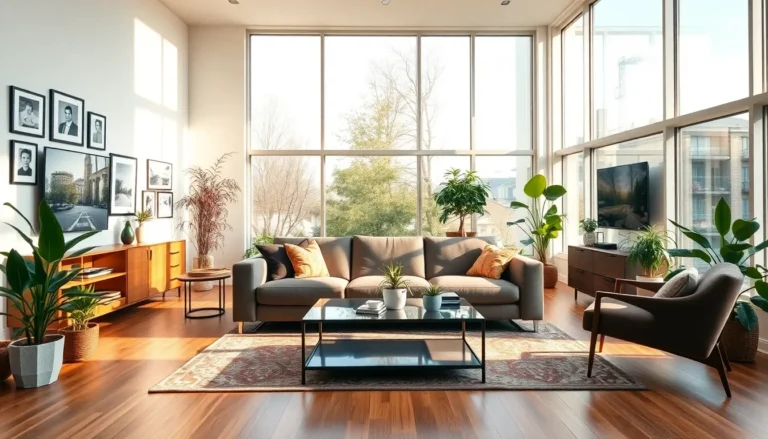Table of Contents
ToggleWhen it comes to housing, the decision to buy a condo or rent can feel like trying to pick the best pizza topping, everyone has an opinion, and it’s hard to know which one is truly the best. Let’s face it: no one wants to end up with a condo that feels like a lead balloon around their finances, or worse, a rental that feels like living in someone else’s closet. In this text, we will break down the essentials of buying versus renting a condo, helping you navigate this exciting, yet daunting, journey with ease and confidence. Get ready to weigh the options as we jump into this real estate face-off.
Understanding The Basics

Before choosing between buying a condo or renting, it’s essential to grasp the fundamentals of each option. A condo, short for condominium, is a private residence owned by an individual in a building with multiple units. On the flip side, renting involves leasing a unit without the ownership responsibilities, making it a popular choice for those who prefer flexibility.
Condos often offer shared amenities like pools and gyms, enhancing the lifestyle experience. But, potential buyers should consider the additional costs associated with ownership, such as mortgage payments, property taxes, and homeowner association fees. Renters typically avoid these financial commitments, but they miss out on building equity, something that can be incredibly beneficial in the long run.
Pros And Cons Of Buying A Condo
Buying a condo can come with its own set of advantages and disadvantages.
Pros Of Buying A Condo
- Equity Building: Each mortgage payment brings increased equity, which can be immensely rewarding when it’s time to sell, allowing owners to cash in on their investment.
- Stability: Homeownership often offers a more stable living situation. There’s no risk of sudden rent hikes or evictions by a landlord, making it easier to plan for the future.
- Customization: Owners have the freedom to personalize their space. Ready to paint that living room orange? Go for it. Renting may limit personal choices.
- Tax Benefits: Homeowners can often deduct mortgage interest and property tax payments from their taxable income, providing financial incentives to buy.
Cons Of Buying A Condo
- Upfront Costs: The initial investment can be significant, including down payments and closing costs, which means it’s not a light decision.
- Maintenance Responsibilities: Homeownership comes with a certain level of responsibility, including property maintenance and repairs that can drain both time and money.
- Market Risks: The real estate market can be unpredictable. Prices may drop, and owners could find themselves in a place where they owe more than their home is worth.
- HOA Fees: Many condominiums have homeowner association fees, which can add another layer of financial commitment.
Pros And Cons Of Renting
Renting also has its share of benefits and drawbacks.
Pros Of Renting
- Flexibility: Renting allows individuals to move more freely. This is ideal for those who may not want to stay in one place for an extended period.
- Lower Upfront Costs: Generally, the initial cost of renting is lower than that of buying. Renters usually only need a security deposit and first month’s rent to get started.
- Maintenance-Free Living: If something breaks, renters can often call the landlord to fix it without facing hefty repair bills themselves.
- Access To Amenities: Many rental properties offer fantastic amenities like pools or gyms without the added costs of ownership.
Financial Considerations
Understanding the financial implications is crucial when deciding between renting and buying a condo.
Buying a condo typically involves monthly mortgage payments, property taxes, homeowner association dues, and maintenance costs. While these expenses may seem daunting at first, they contribute to equity accumulation over time. Conversely, renting generally involves a consistent monthly rent payment, with few additional costs beyond utility bills and renters insurance.
One must also consider market conditions. In bustling cities, high demand can inflate rents, making them comparable to substantial mortgage payments. In contrast, areas with slower real estate markets may present buyers with negotiable prices, thereby making buying a more attractive long-term investment.
Long-Term Investment Potential
Considering long-term investments is crucial when deciding to buy or rent. A condo can appreciate over time, depending on market conditions. For many, a condo isn’t just a place to live, but a significant asset that can improve their financial standing.
If an individual rents, while they enjoy lower costs and flexibility, they forfeit any chance to benefit from rising property values. Homeownership can serve as a hedge against inflation: as prices rise, so does the value of the owned property. Also, it can provide a stable retirement plan, generating a profit when sold or providing rental income if it becomes an investment property.
Lifestyle Factors To Consider
Choosing between buying a condo and renting heavily depends on lifestyle factors.
If she loves the idea of hosting dinner parties in her stylishly decorated home, owning a condo might be the better fit. On the other hand, for someone who thrives on spontaneity and change, renting may be the optimal choice.
One must also account for personal commitments such as family, job stability, and community ties. Living close to work can weigh heavily on the decision. Owning a home in a friendly community may provide far greater satisfaction than renting an apartment in an unfamiliar area.
Making The Right Choice For You
Eventually, the choice between buying a condo and renting boils down to various personal circumstances. It’s important to take a step back and evaluate one’s financial situation, lifestyle preferences, and long-term goals. Is stability important? Or is flexibility paramount? Understanding these needs can help guide the decision-making process.
Whether opting for the thrill of homeownership or the ease of renting, what’s most vital is finding a residence that feels like home.







